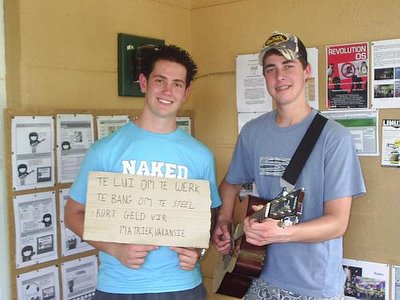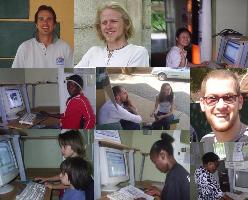OpenCafeBlog
All about our open source & open content projects and everything else that happens in the cafe ...
Thursday, November 24, 2005
Go_open page updated

Go_open is a 13 episode tv series all about open source software.
You can download it free of charge - or buy the DVD for R199.
You can also come and watch it in the cafe - just mail us or phone in advance and we get it ready for you in the multimedia room.
Click to visit our Go_open page for more info!
Tuesday, November 22, 2005
Learning Commons launches 'Copyright, copyleft and everything in between'

.
'Copyright, copyleft and everything in between' is a multimedia curriculum on copyright alternatives in South Africa. It covers the social and economic impact of technology from an African perspective, focusing specifically on the origins of copyright and the impact of open source software and open content on African development. The materials have been released under the Creative Commons Attribution Share-Alike South Africa licence which enables you to freely copy and share the files, make derivatives (including translations) - even for commercial use (as long as you attribute us and licence the derivative under the same terms)! Download it here, order the published copy or contact us for more details.
Sunday, November 20, 2005
Finally starting the Kalmar pages
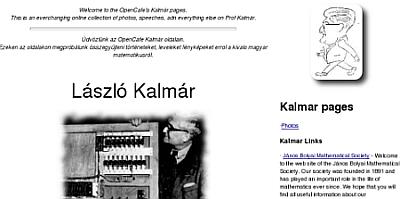
We did mention the need to have our own history section where we collect information on specific topics like the story of the computer, the history of the open source movement and similar topics.
The first of the history pages is dedicated to Hungarian mathematician, Laszlo Kalmar. He was ackowledged as the leader of Hungarian mathematical logic.
He was posthumously awarded the computer poineer award by IEEE Computer Society "For recognition as the developer of a 1956 logical machine and the design of the MIR computer in Hungary"
Click here to read on ...
Friday, November 18, 2005
One year has passed - have a look what everyone is saying about the OpenCafe
Hi everyone! I thought it's a good idea to think back and look at all that we have accomplished during this year.
If you have a sec, click here to add your toughts, suggestions about the OpenCafe - as well as read what everyone else says about the cafe.
Tuesday, November 15, 2005
Why open source ?
Here is an article Eugene published some time ago:
I have been approached by many developers regarding the benefits of using Open Source in their software companies. Although the benefits of using Open Source software and Linux in particular is always enumerated in terms of advantages to the 'users', many developers still don't seem to get the point.
After all we are talking about giving software away for gratis. How can anyone build a business on such an idiotic business model?
Let me start of by saying that I assume that you are reading this article because you are a developer or working for a software development company. I also assume you have access to a good search engine (I recommend Google) and that I don't have to post links to each and every technological reference I make.
You are reading this article in a portal build on the Linux operating system, augmented by an Open Source database called MySql and an Open Source Content Management System (CMS) called WebGUI served through an Open Source web server called Apache. All these components we downloaded for gratis and because I can help myself with software and technology I had little trouble in setting up this portal at a fraction of the cost associated with similar proprietary systems.
Yes – there is no free lunch. We had to learn Linux, I had to read up quite a bit on how the Apache web server works , I had to read README files from four different projects – and in the beginning I had to struggle a bit. But – besides for the fact that I have a stable, secure and professional portal up and running at virtually no license fee I can guarantee you that as a software developer I have so much more insight into what I'm actually doing when I'm designing a web based application than I would ever have had using all the proprietary wizards and gadgets which comes with Microsoft's developers tools. I got my hands dirty and I'm much richer for that.
That is not where the story ends. I can take this software as mine – I mean all of it including the operating system, I can do with it whatever I please and I can develop new applications and sell it for profit.
We can reuse our software because the development tools and frameworks are stable – the technology is not dependent on a single vendor changing its mind all the time and along with that all its development tools - ala each and every over-hyped and overrated "state of the art" technology (each of them lasting about two years - I started setting my watch to the rythm) DDE, OLE, COM, COM+, .NET and so forth and so on ad nausea ad infinitum. At one stage I found myself developing a rather large and complex VB based application three times - once for VB4 to VB5, then VB5 to VB6 and now from VB6 to VB.NET. Everytime the the promises were the same - "no hassles in reusing old source in new tools" - but in practice it was easier to rewrite than trying "to migrate". Each time the client payed for the same software with little or no added benefits - each time we had to buy a whole new range of morbidly expensive developer tools - each time we lost out badly at the end day. I was one of those unfortunate souls who jumped on the "Visual" Java bandwagon in utter desparation to build some code that I can actually reuse - just to have the carpet pulled from underneath me rather unceremoniously about six months later - after investing considerable time and effort in porting some of my stuff to this brand new and promising platform.
Now - when something goes wrong – we can fix it ourselves, gone are the days that I had to apologise to a client that I can really do nothing about a bug which almost destroyed his business because I have to wait for the next ADO patch (if and when it eventually came out).
Now we have real support - I can log onto a website and discuss problems openly with millions of other developers around the globe. There is a lot of brute power in that. Open Source empowers you and the psychological effect of being the master of your own universe I will not exchange for any "user-friendly wizard" based proprietary development tool – even if all that came at no licensing fee or even if they payed me to use their closed source bug infested products.
My next article will be about the most misunderstood aspect of Open Source development - licensing regimes and what it implies for your business model.
Eugene on software licensing
The first most important thing to understand - the difference between the words "free" and "gratis". We use the word "free" in the context of the French word "libre" (ala freedom) - not like in mahala or at no cost or gratis.
The second most important thing to understand is that there is absolutely no obligation to develop Open Source software when you are developing for the Linux platform. There are lots of vendors developing proprietary software for Linux and Unix type systems. The contrary is also true - you can develop Open Source software for Microsoft and Mac platforms.
Many of the large Open Source projects are truly cross-platform. Notable examples are Apache, MySql, Mozilla and Open Office - to name but a few.
As a developer you have the choices to use Open Source software in your products and/or to license your software under an Open Source license. You may even select more than one Open Source license and also a proprietary license for the same software. You may release a bare bones Open Source version of your software (good PR and marketing ploy) and a proprietary version with some special added features.
An assortment of Open Source approved licenses can be found at opensource.org I'm going to try to simplify things by dividing the various licenses into two distinct groups i.e. the copyleft type license and the non-copyleft type license.
( see www.gnu.org/philosophy/license-list.html for a very complex but thorough explanation)
The General Public License (GPL) - which is the best known copyleft type license and also the license under which GNU/Linux is distributed is designed to perpetuate the freedoms offered by the license. This means that when you derive your software from GPL code or link to GPL licensed libraries you must distribute the derived product under the GPL license. This in turn means you must give the recipient of the product the source code and the right to modify, derive and distribute it. Please note - the copyleft type license doesn't say you may not charge a lot of money for this, nor does it demand that you should upload all your code to the internet or distribute it to every living soul on this planet who happens to own a PC. It is also perfectly legal to distribute the product to only one client (by contract) under a NDF. The moment you have distributed the software to your client along with the source code (with GPL license in tact) - you have complied with the GPL and its is up to your client to honor the GPL. It is crucial that you inform your client of the requirements of the GPL before award of contract if his intentions are to create a proprietary product that he wishes to distribute.
The Modified BSD license is known as a non-copyleft type license. This license is truly free - it does not require you to redistribute your source code and therefore you can develop proprietary software derived from Modified BSD licensed type code. Needles to say it does nothing to guarantee that derivative works will remain free.
A third but important variant which doesn't fit into any of the two above categories is the Library (or Lesser) General Public License (LGPL) which is a copyleft license often used to distribute a software library. The important distinction is that whereas you may not link proprietary code to a GPL library you may link it to a LGPL library. The derivative work can be distributed as a proprietary product - you do however have to distribute the LGPL library's source code along with all modifications you may have made to it with the product.
Clear as mud? Good. Things can get pretty complex in IP law, try to read Microsoft's EULA and catch my drift.
Lets summarise -
1 - You don't have to give your source code away if you don't see a good business proposition in that - even when you are developing for Linux platform.
2 - When you use the GPL you have to distribute the source code with the software.
3 - When you use the modfied BSD its a free for all - you can use BSD source code in your proprietary products.
4 - You can link proprietary code against LGPL libraries - but not GPL libraries.
Licensing, Copyright and Patent laws are complex and Open Source software doesn't necessarily escape the endless flow of IP related legal battles that has been a hallmark of commercial software. Recently SCO has launched a $5 billion legal challenge against IBM for allegedly contributing code from IBM's AIX version of Unix to the Linux project. You can follow the merits of the case at Groklaw.
In order to establish a better understanding of how Open Source software fits into a commercial model it is quite enlightening to read Novell's Chris Stone's speech at the Open Source Business Conference 2004 after Novell's recent acquisition of Suse Linux.
"He said Novell's $250m acquisitions proved Novell doesn't believe open source will destroy the software industry, while open source is a movement dominated by professional developers already working in the IT industry.
"'Sixty percent of the people in the development community working for you also work in open source. They work for you! Linux, Apache and PHP are exceptional software,' Stone said. . . .
"Stone told open source ISVs to compete on customer service and applications not infrastructure like operating systems, which are becoming increasingly commoditized.
"'We have got to recognize where the value lines are... we spent money building the infrastructure but the value is in the services - identity, security and office. That's where the money is. Not underneath. Until you realize that you won't make money.'"
Saturday, November 12, 2005
TappyTux - OpenLab and thin clients
AJ just uploaded the latest version of TappyTux.
It'll soon be installed on our computers so that we can test it with the kids here.
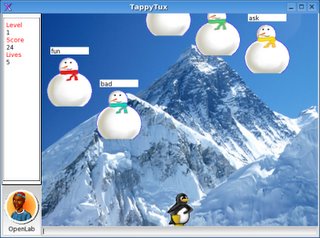 TappyTux is a children's educational game suite, created originally for a project by SchoolNet Namibia. The game is Free Software, and all the artwork and sound are under GPL compatible creative-commons licenses.
TappyTux is a children's educational game suite, created originally for a project by SchoolNet Namibia. The game is Free Software, and all the artwork and sound are under GPL compatible creative-commons licenses.It is fun and addictive, and although it is meant for children, many adults have told me they
love it too.
Version 2 takes it to the next level however, the interface and game code had a massive overhaul, sound and music support was improved and the game was modularised to allow many different game types to be played on the same engine.
The current version ships with two modules, tappywords (a typing tutor) and tappymath
(an algebra game). Writing new modules is really easy so even a beginner programmer could add more. The game is designed to work well in a thin-client lab, and as of this release, is based on GTK2, improving not just the look and feel but also the internationalisation support.
Download
The game is shipped as a slackware / OpenLab package, which means a simple extraction should work on most modern distributions. You can download it here
The OpenCafe is run on a thin client network - this setup enables us to run the cafe from one single computer - all 20 workstations have their thin clients that act as a connection to the main computer.
This setup is also used by the TuxLab project of the Shuttleworth Foundation and also by OpenLab .

OpenLab is the oldest African developed GNU/Linux distribution. Started in 2001, the product has built up a well deserved reputation for ease-of-use, innovation and user-oriented design.
The latest version (4.0 - Perdita), released September 2005 takes this further once more, with the new installable LIVEcd, greatly improved OLAD (OpenLab ADministration tool) and many other innovations ranging from backend systems such as the hyperdrive suite which completely decomplexifies the handling of removable media to user-level enhancements such as the highly integrated desktop theme featuring the award winning Nuvola icon set.
OpenLab's historic strength as a thin-client system is taken to new heights with 4.0 adding even better integration for local devices and improved sound support while taking the unique adaptive-desktop technology to new levels for even greater ease of use.
OpenLab was orriginally developed as a niche solution for the education sector but over it's four year life-cycle has grown into a complete desktop operating system well suited to the home desktop, small business and many other environments where it usually leaves other contenders far behind.
Developed using principles from extreme programming, with constant involvement of a wide-range of participants in the process with frequent reevalutation of designs, OpenLab is an innovative, vibrant and above all fun platform that continuously evolves to meet the real needs of the desktop market.
Have you got OpenLab yet ?
Wednesday, November 09, 2005
Continuing the story of the telecenter in the Liberian refugee camp called Buduburam

Not long ago I wrote about Jopie's experiences in Buduburam, a refugee camp close to Accra - today I have discovered a video documentary about the very same telecenter by Andy Carvin on the Global Voices site.
Click here to download it.
Saturday, November 05, 2005
History pages on the OpenCafe site
We are so used to computers and the Internet - we take it for granted here in the OpenCafe - just like water and electricity. But what are computers? And what is the Internet? And how did it all start?
We are planning to set up pages that will tell the story of the creation and early development of computers and the Internet so that we can understand how digital culture came about - and how we can develop it into a powerful tool that will play a major part in the social and economic development of the globe.
My grandfather, László Kalmár has devoted his life working on the design and development of the early computers.
This is what I wrote about him on my blog:

My grandfather, László Kalmár was an exceptional person, a very talented mathematician. To us he was Nagyapo (grandfather) - that is how all of us called him at home.
I don't have too many memories of him since he passed away in 1976 when I was only 7 years old.
I do have a few pictures in my mind, we used to have breakfasts together (we stayed right next door to where he lived with my grandmother), I remember him riding his bicycle to university and back.

He was very absent-minded - we used to joke about it - for example on rainy days he used to walk about on the corridors of the university with his umbrella open - as he forgot to close the umbrella after stepping inside the building. (I am not sure if this is true - but probably I am right).
Nagyapo normally was very busy with the science projects he was involved in. He was also lecturing at the university of Szeged, my home town. I remember sitting in the big lecture hall watching him explain complex mathematical formulas to the students. For me it was all so boring - as I was very young (not that later I was more interested in all those formulas - I was never really good at mathematics).
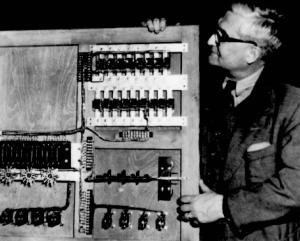
Trying to sum up the projects he was involved in - here is a quote from The MacTutor History of Mathematics archive :
"He founded at Szeged the first chair for the Foundations of Mathematics and Computer Science and then became the first to occupy the chair. This was not all he founded at Szeged, for he also set up the Cybernetic Laboratory and the Research Group for Mathematical Logic and Automata Theory.
.... He was acknowledged as the leader of Hungarian mathematical logic.
.... Kalmár was also involved in theoretical computer science and promoted the development of computer science and the use of computers in Hungary. His special fields of interest in computer science included programming languages, automatic error correction, non-numerical applications of computers and the connection between computer science and mathematical logic."
The Wikipedia says :
"He is considered the founding father of both Logic and Theoretical Computer Science in Hungary."
in 1996 - he was posthumously awarded the computer poineer award by IEEE Computer Society "For recognition as the developer of a 1956 logical machine and the design of the MIR computer in Hungary"
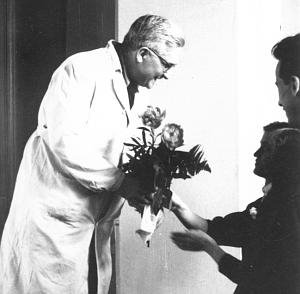
Very big words - an unbelievable life.
Surprisingly I never worked with computers while I was in Hungary. While most others in my family (especially the guys) were quite into computers - I was busy with music and languages.
I only started working with computers when I arrived in South Africa. We bought a PC because I wanted to use the Internet to keep in touch with family in Hungary.
That was 7 years ago. Since then I cannot get enough of it. It's unbelievable what one can achieve with computers - it's an amazingly versatile tool - especially when it comes to using it as a tool for global communication & collaboration.
So now that I am so interested in computers I will definitely spend time finding out all about my grandfather's projects and also make sure that everyone else gets to learn about him and will get inspired to start their own mathematics related projects.
So what can you do in the multimedia room?

Since its launch on Software Freedom Day the multimedia room hasn't been really used for all the great things we planned it for.
You can Skype, record voice and music with Audacity, you can sample the audio and video collection of the Internet Archive, watch Go_open, and even have free music lessons and experiment with ccMixter.co.za the music sharing portal that enables you to upload and download music samples and use them in your own remixes.
Click here to find out more!
Friday, November 04, 2005
The latest from Geekcorps, Ghana ( Introducing MOPGEL - Liberia )
Jopie has just sent the latest on his experiences as a Geekcorps Ghana volunteer.
In this letter he is writing about a Liberian NGO called MOPGEL:
"Yesterday i visited the Liberian refugee camp here close to Accra - it is called Buduburam and has been in existence for about 14 years with more than 40 000
liberian refugees who came to Ghana to escape the wars that has been destroying their country for the past decades.
I went to visit a guy there that is running a small NGO project called MOPGEL - Movement for the Promotion
of Gender Equality in Liberia.
The guy, Hisenburg Togba, showed me his little computer center where they
provide basic computer literacy and office skills.
They got about 20 computers (of which 8 works) no network, no internetline and one old printer. With this they manage to give hour-long classes and sessions for about 10 hours of the day!
http://www.mopgel.org/
I would love to get involved with this project and hoping that maybe you can give me some advice - for one thing i would love to move their focus to opensource and try and get some funding to fix computers, to provide training for trainers, to get
connectivity to name but a few issues that needs to addressed.
This project is currently in operation in the refugee camp but of course their vision is to get more and more action inside Liberia itself. Liberia must be one
of the least connected countries in Africa. Illiteracy is somewhere in the 80% because the social fabric and services like schools totally broke down during the war. Now at last they had democratic election and everybody is very optimistic and there is huge movement to rebuild the country. I believe the opportunity to make use of ICT technologies in this process can be invaluable."
